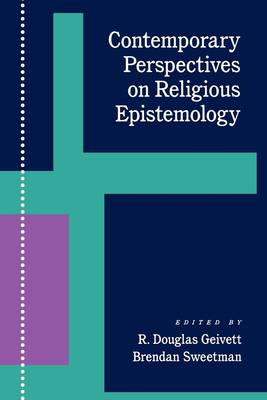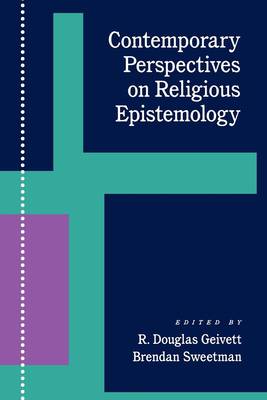
- Afhalen na 1 uur in een winkel met voorraad
- Gratis thuislevering in België vanaf € 30
- Ruim aanbod met 7 miljoen producten
- Afhalen na 1 uur in een winkel met voorraad
- Gratis thuislevering in België vanaf € 30
- Ruim aanbod met 7 miljoen producten
Zoeken
Contemporary Perspectives on Religious Epistemology
R Douglas Geivett, Brendan Sweetman
Paperback | Engels
€ 228,95
+ 457 punten
Omschrijving
This unique textbook--the first to offer balanced, comprehensive coverage of all major perspectives on the rational justification of religious belief--includes twenty-four key papers by some of the world's leading philosophers of religion. Arranged in six sections, each representing a major approach to religious epistemology, the book begins with papers by noted atheists, setting the stage for the main theistic responses--Wittgensteinian Fideism, Reformed epistemology, natural theology, prudential accounts of religious beliefs, and rational belief based in religious experience--in each case offering a representative sample of papers by leading exponents, a critical paper, and a substantial bibliography. A comprehensive introductory essay and ample cross-references help students to contrast and evaluate the different approaches, while the overall arrangement encourages them to assess the full range of philosophical positions on the issue.
Carefully selected to provide both a comprehensive overview of current work and a series of modern perspectives on many classic sources--Swinburne's detailed discussion of Hume's critique of the design argument, for example, as well as an entire section evaluating and extending Pascal's famous Wager--the essays also provide a uniquely readable survey that will be useful in a wide range of undergraduate and graduate courses in philosophy of religion and epistemology.
Carefully selected to provide both a comprehensive overview of current work and a series of modern perspectives on many classic sources--Swinburne's detailed discussion of Hume's critique of the design argument, for example, as well as an entire section evaluating and extending Pascal's famous Wager--the essays also provide a uniquely readable survey that will be useful in a wide range of undergraduate and graduate courses in philosophy of religion and epistemology.
Specificaties
Betrokkenen
- Auteur(s):
- Uitgeverij:
Inhoud
- Aantal bladzijden:
- 368
- Taal:
- Engels
Eigenschappen
- Productcode (EAN):
- 9780195073249
- Verschijningsdatum:
- 4/02/1993
- Uitvoering:
- Paperback
- Formaat:
- Trade paperback (VS)
- Afmetingen:
- 156 mm x 235 mm
- Gewicht:
- 535 g

Alleen bij Standaard Boekhandel
+ 457 punten op je klantenkaart van Standaard Boekhandel
Beoordelingen
We publiceren alleen reviews die voldoen aan de voorwaarden voor reviews. Bekijk onze voorwaarden voor reviews.








